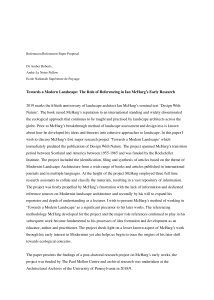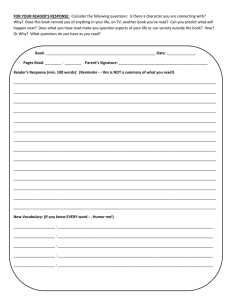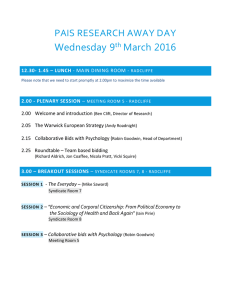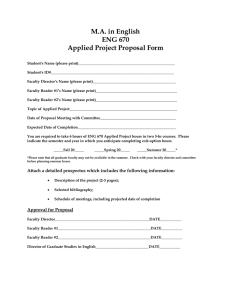11.800, Knowledge in the Public Arena: The Uses and Abuses... Professors Xavier de Souza, Frank Levy, and Martin Rein
advertisement
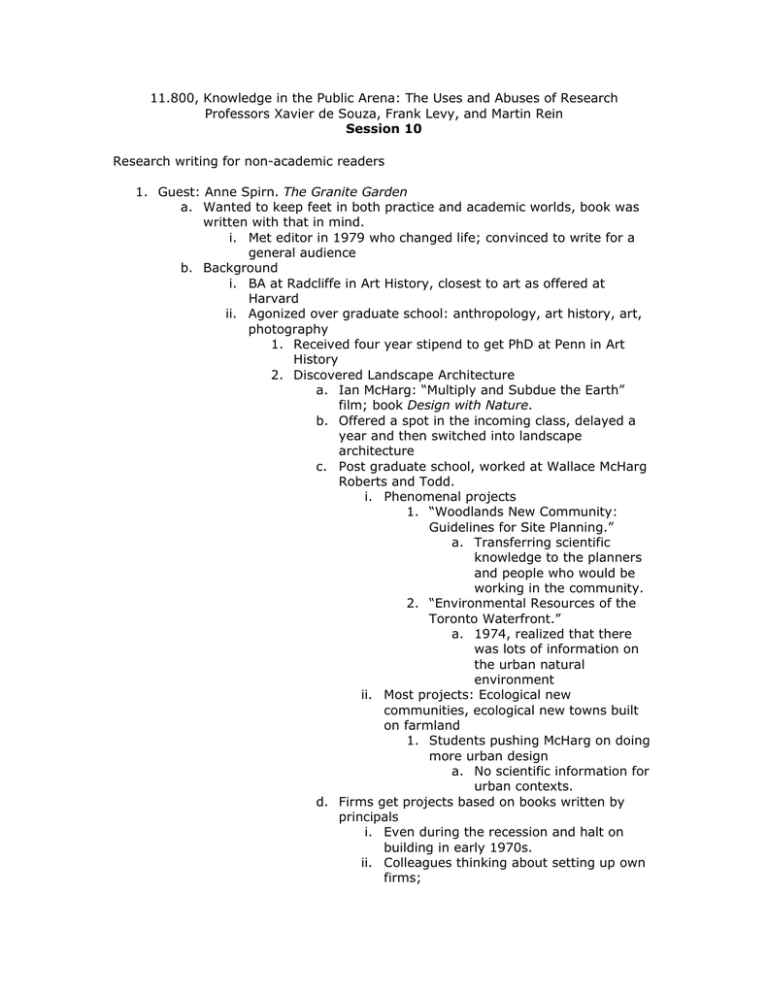
11.800, Knowledge in the Public Arena: The Uses and Abuses of Research Professors Xavier de Souza, Frank Levy, and Martin Rein Session 10 Research writing for non-academic readers 1. Guest: Anne Spirn. The Granite Garden a. Wanted to keep feet in both practice and academic worlds, book was written with that in mind. i. Met editor in 1979 who changed life; convinced to write for a general audience b. Background i. BA at Radcliffe in Art History, closest to art as offered at Harvard ii. Agonized over graduate school: anthropology, art history, art, photography 1. Received four year stipend to get PhD at Penn in Art History 2. Discovered Landscape Architecture a. Ian McHarg: “Multiply and Subdue the Earth” film; book Design with Nature. b. Offered a spot in the incoming class, delayed a year and then switched into landscape architecture c. Post graduate school, worked at Wallace McHarg Roberts and Todd. i. Phenomenal projects 1. “Woodlands New Community: Guidelines for Site Planning.” a. Transferring scientific knowledge to the planners and people who would be working in the community. 2. “Environmental Resources of the Toronto Waterfront.” a. 1974, realized that there was lots of information on the urban natural environment ii. Most projects: Ecological new communities, ecological new towns built on farmland 1. Students pushing McHarg on doing more urban design a. No scientific information for urban contexts. d. Firms get projects based on books written by principals i. Even during the recession and halt on building in early 1970s. ii. Colleagues thinking about setting up own firms; iii. Decided to write a book that would create a clientele for the kind of work I wanted to do 1. Wrote grant proposals, cut back to 30 hours a week (3 days a week); 2. Received fellowship from Radcliffe Institute a. Spent year doing literature research i. A ton of material available, scattered b. At end of year, Radcliffe Institute held publishers day i. City in History editor started own practice as literary agent, gets cut of royalties ii. What do you want to write? Who is your audience? iii. Think about writing for a general audience and send a prospectus: Contents, Sequence of Ideas (Plot), Description of Organization, etc. 3. Started teaching Masters in Architecture program a. Discovered that architecture students don’t read b. Decided to target a general audience for books c. Norton, Pantheon, Basic, wanted to see sample writing, sample chapters. d. Writing was much more difficult than I thought 3. Interested in figuring out ways for practitioners to do what they do better. a. Trade Publishers vs. Academic Publishers i. Trade: for general audience, 40% discount to bookstore ii. Academic: 10% discount to bookstore, so bookstores don’t carry them iii. Some tension eased through Amazon, though you still have to pay more for the book. c. Story of writing: i. Finding a voice 1. Struggled with finding a voice for “Air” and “Earth” chapters. ii. iii. iv. v. 2. You must keep the reader reading; have a responsibility to your reader 3. How do you grab an audience that is not in your field but still be demanding of the audience and produce some surprises for them? Structure of the book 1. Original structure: consequences of ignoring the information first; benefits of using information second a. Problem: wading through negative might turn away audience b. The structure will come from the material i. Problems with literature: different disciplines weren’t speaking to each other 1. New Structure: Air; Earth; Water; Life; Ecosystems 2. Sent to publisher, they say it needs an Introduction a. Introduction: introduces the ideas b. Prologue: introduces the actors c. Epilogue: imagining the future d. Bibliography: in original manuscript, bibliography took up 25% of the pages; Basic printed it in reduced type so it would not be overwhelming to general reader Gestalt of the book (as opposed to article or edited volume) 1. While writing book, advised to stop and write three articles 2. Took six months off to try to write articles, but decided to go ahead and finish the book instead Practice vs. Academia Aftermath of the book 1. Not tenured at the point of publication 2. Reviewed in New York Times Book Review the week of its publication a. Boston Globe op-ed at conference where I presented the book b. Phone calls come in asking about practice i. If I had gone into a practice, it would have done what I wanted ii. Decided to give academia ten years 1. No examples of people teaching and practicing with intact marriages 3. Started getting reviews in journals a. Architecture, Landscape Architecture, Planning, History, Geography; etc. i. Jargon tends to prevent academics from crossing disciplines. ii. Spawned new field of urban environmental history 4. Books have a lifetime a. Longer than articles b. The Granite Garden is still in print.
